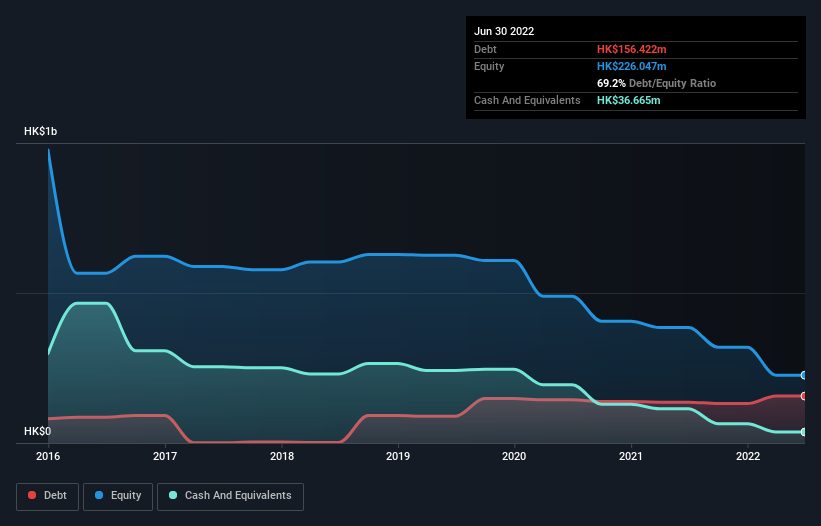The external fund manager backed by Berkshire Hathaway's Charlie Munger, Li Lu, makes no bones about it when he says 'The biggest investment risk is not the volatility of prices, but whether you will suffer a permanent loss of capital.' When we think about how risky a company is, we always like to look at its use of debt, since debt overload can lead to ruin. Importantly, Paradise Entertainment Limited (HKG:1180) does carry debt. But should shareholders be worried about its use of debt?
What Risk Does Debt Bring?
Debt and other liabilities become risky for a business when it cannot easily fulfill those obligations, either with free cash flow or by raising capital at an attractive price. If things get really bad, the lenders can take control of the business. While that is not too common, we often do see indebted companies permanently diluting shareholders because lenders force them to raise capital at a distressed price. Of course, plenty of companies use debt to fund growth, without any negative consequences. The first step when considering a company's debt levels is to consider its cash and debt together.
See our latest analysis for Paradise Entertainment
What Is Paradise Entertainment's Net Debt?
As you can see below, at the end of June 2022, Paradise Entertainment had HK$156.4m of debt, up from HK$136.2m a year ago. Click the image for more detail. However, because it has a cash reserve of HK$36.7m, its net debt is less, at about HK$119.8m.

A Look At Paradise Entertainment's Liabilities
We can see from the most recent balance sheet that Paradise Entertainment had liabilities of HK$96.2m falling due within a year, and liabilities of HK$154.3m due beyond that. Offsetting this, it had HK$36.7m in cash and HK$27.2m in receivables that were due within 12 months. So it has liabilities totalling HK$186.6m more than its cash and near-term receivables, combined.
While this might seem like a lot, it is not so bad since Paradise Entertainment has a market capitalization of HK$568.2m, and so it could probably strengthen its balance sheet by raising capital if it needed to. But we definitely want to keep our eyes open to indications that its debt is bringing too much risk. When analysing debt levels, the balance sheet is the obvious place to start. But it is Paradise Entertainment's earnings that will influence how the balance sheet holds up in the future. So if you're keen to discover more about its earnings, it might be worth checking out this graph of its long term earnings trend.
Over 12 months, Paradise Entertainment made a loss at the EBIT level, and saw its revenue drop to HK$417m, which is a fall of 3.4%. That's not what we would hope to see.
Caveat Emptor
Importantly, Paradise Entertainment had an earnings before interest and tax (EBIT) loss over the last year. Its EBIT loss was a whopping HK$151m. When we look at that and recall the liabilities on its balance sheet, relative to cash, it seems unwise to us for the company to have any debt. Quite frankly we think the balance sheet is far from match-fit, although it could be improved with time. However, it doesn't help that it burned through HK$82m of cash over the last year. So suffice it to say we consider the stock very risky. The balance sheet is clearly the area to focus on when you are analysing debt. But ultimately, every company can contain risks that exist outside of the balance sheet. For instance, we've identified 3 warning signs for Paradise Entertainment (2 shouldn't be ignored) you should be aware of.
At the end of the day, it's often better to focus on companies that are free from net debt. You can access our special list of such companies (all with a track record of profit growth). It's free.
New: Manage All Your Stock Portfolios in One Place
We've created the ultimate portfolio companion for stock investors, and it's free.
• Connect an unlimited number of Portfolios and see your total in one currency
• Be alerted to new Warning Signs or Risks via email or mobile
• Track the Fair Value of your stocks
Have feedback on this article? Concerned about the content? Get in touch with us directly. Alternatively, email editorial-team (at) simplywallst.com.
This article by Simply Wall St is general in nature. We provide commentary based on historical data and analyst forecasts only using an unbiased methodology and our articles are not intended to be financial advice. It does not constitute a recommendation to buy or sell any stock, and does not take account of your objectives, or your financial situation. We aim to bring you long-term focused analysis driven by fundamental data. Note that our analysis may not factor in the latest price-sensitive company announcements or qualitative material. Simply Wall St has no position in any stocks mentioned.
About SEHK:1180
Paradise Entertainment
An investment holding company, provides casino management services in Macau, the People’s Republic of China, the Philippines, the United States, and internationally.
Outstanding track record with flawless balance sheet and pays a dividend.
Market Insights
Community Narratives



